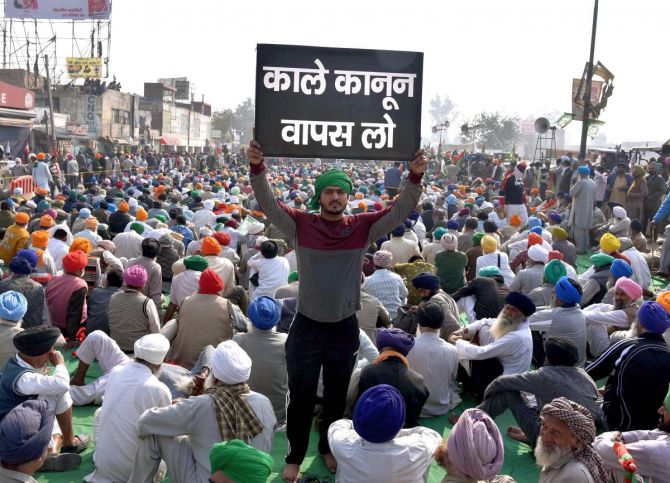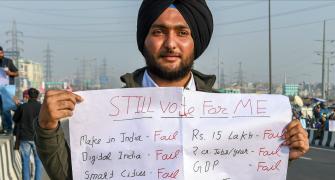'Nothing will stop India's top three-four corporates who have become aggressive players in the agri-markets after Modi came to power from acting in concert to drive down at will the prices at which they buy from farmers.'
'These corporate houses have the wherewithal to purchase all the farm produce at low prices and store them for a long period of time.'
'Once the harvest season is over they will sell the same produce at higher prices.'

Devappa Anna Shetti aka Raju Shetti of the Swabhimani Paksha, has always been in the forefront of various farmers' agitations in Maharashtra.
In 2018, Shetti -- who then represented the Hatkanangle constituency in Maharashtra -- had tabled two private members' bills in the Lok Sabha that envisaged guaranteed MSP (minimum support price) for farmers' produce and on solving their indebtedness.
These two bills are now in focus as leaders of agitating farmers in Delhi have demanded that Shetti's bill on MSP be adopted by the government.
Shetti spoke to Prasanna D Zore/Rediff.com about the two bills that lapsed along with the 16th Lok Sabha and how the three farm laws enacted by Prime Minister Narendra Damodardas Modi's government could lead to corporate houses monopolising agri-markets in India.
The private members' bills on guaranteed MSP remuneration and complete loan waiver of farmers that you had tabled in the Lok Sabha in 2018 are back in the limelight with farmers' unions citing the same to government representatives.
What were the provisions of the bills and how could they help the farmers today?
The first was related to the rights of farmers to become debt-free.
The Farmers' Freedom from Indebtedness Bill 2018 provided for the central government to take on the responsibility for farmers' debt.
High costs associated with production of foodgrains and other farming activities were the prime reasons why farmers became heavily indebted.
Farming has always been a loss-making enterprise for farmers and that's the reason for their indebtedness.
A lot of expert studies and reports by institutions have decisively concluded that the central government's lopsided farm policies were the reason for this indebtedness. And so the central government should take care of all the debt incurred by farmers till now.
All central governments till now are guilty of mounting debt on farmers.
Isn't agriculture also a state subject? Don't state government policies also lead to farmers' indebtedness? Shouldn't they also take on the responsibility for making farmers debt-free?
Even if agriculture is a state subject, the fact is that all the farm production comes under the purview of the Essential Commodities Act.
Various central governments have often made use of the ECA to control prices of farm produce by sometimes imposing ban on exports, and sometimes by importing foodgrain in bulk to depress domestic prices.
Export bans and liberal import policies both increased the supply, resulting in depressed prices of agriculture produce for farmers.
At times, these price control policies forced farmers to sell their produce even below their cost of production. All this has led to a debt burden of Rs 2.25 lakh crore on India's farmers.
The central government, thus, must take on the responsibility of making farmers debt-free and make one-time budgetary provision for the same.
Once this budgetary provision is in place, farmers will need a guaranteed MSP remuneration for them not to fall into the same debt trap again. Many people ask why governments waive off farmers' loans every now and then.
And that is where the Farmers' Right to Guaranteed Remunerative Minimum Support Price for Agricultural Commodities Bill 2018 (the second bill tabled by Shetti in 2018) comes into focus.
Once the farmers' debt reaches zero, the provisions of the Farmers' Right to Guaranteed Remunerative Minimum Support Price for Agricultural Commodities Bill 2018 would ensure that farmers get such a remunerative price for their produce that they will not have need to borrow money for their farming activities.
One of the provisions of this bill was that any person, corporate or contractor, cannot purchase any farm produce at prices below the MSP announced by the government. Violation of this would lead to penalties and action against the concerned party.
What kind of MSP remuneration did your bill envisage?
We had provided for MSP remuneration based on the recommendations of the M S Swaminathan Committee. We had provided for guaranteed C2 (stands for Comprehensive Cost) plus 50 per cent price for agricultural produce.
What is comprehensive cost in this formula? What all does it include?
This formula takes into account paid-up cost of production for farmers which includes imputed cost of family labour, imputed land rent of owned land and imputed interest on owned capital, insurance, and depreciation of capital inputs. The Swaminathan Commission recommended a 50 per cent mark up on this comprehensive cost.
Wouldn't the three farm laws enacted by the Modi government free farmers from the fetters of the ECA?
Won't they now, as per these three laws, not be bounded by export bans and sell their produce to whoever they want?
That's what the supporters of these three farm laws are claiming.
Who told you that the government won't be in a position to control prices of essential commodities whenever it suits them? This is just this government's hypocrisy, show-off.
Let me give you an example.
In June 2020, the Modi government promulgated an ordinance to remove farm produce from the purview of ECA. The President immediately gave his go ahead to this ordinance.
Even before the ink on the presidential assent on this ordinance could dry up, the Modi government banned the export of onions.
This is the best example of how hypocritical this government is when it comes to the welfare of farmers.
If you had freed farmers from the clutches of government control, then why did you ban export of onions?
The ban was lifted only last week and that too because the onion prices had fallen so much in the domestic market that finally the government would have had to purchase the onions from farmers. And they don't want to the extra burden for themselves given the state of their coffers.
This is how the government rides roughshod over farmers' interests; the Modi government is guilty of taking farmers for a ride again and again. But when it comes to the interests of corporates, this government is a habitual liar.
While the Modi government claims that the three farm laws will help farmers, a huge section of farmers are agitating for the repeal of the same three laws. How do you think these three laws will harm farmers' interests?
This is how corporates will monopolise farm produce for making huge profits.
The top three-four corporates will come to farmers as buyers just when they have harvested their crops.
The biggest stumbling block for these corporates was the inclusion of farm produce in the ECA and now since that is not the case, the corporates are not bound by any stock limit or storage restrictions as per the provisions of the earlier ECA.
These corporates with unlimited capital and resources at their disposal will enter private markets as buyers during harvest time when the prices are at a low (huge supply drives down prices) and given their bargaining power and money heft will drive down prices even more and buy huge amounts of agriculture produce at very depressed prices.
With there being no restriction on how much these big contractors can purchase and store for as long as they want, they will sell the same produce to consumers at will and at higher prices making huge profits.
While nobody is against corporates making profits, these profits made by corporates taking undue advantage of the Modi government's new farm laws puts the farmers at the mercy of these corporate mercenaries.
This practice will not just finish off the farmers, but also small traders who buy agricultural produce from farmers.
In such a situation, nothing will stop India's top three-four corporates who have become aggressive players in the agri-markets after Modi came to power from acting in concert to drive down at will the prices at which they buy from farmers.
These corporate houses have the wherewithal to purchase all the farm produce at low prices and store them for a long period of time. Once the harvest season is over they will sell the same produce at higher prices.
India's farmers understand this corporate-Modi government nexus quite well. Just because the farmers have seen through this game they are being dubbed as Pakistanis, Khalistanis, anti-national and what not.
That's the game this government has been playing to run down all political opposition to its inhuman policies.










